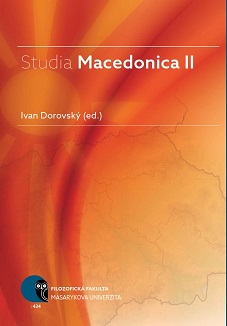Makedonské regionální skupiny. Problémy klasifikace, etnonym a kolektivních identit
Macedonian regional groups. Problems of classification, ethnonyms and collective identities
Author(s): Helena Bočková
Subject(s): South Slavic Languages, Cultural Anthropology / Ethnology, Culture and social structure , Sociology of Culture, Philology, Identity of Collectives
Published by: Masarykova univerzita nakladatelství
Keywords: Macedonian ethnocultural groups; regional groups; collective identity; Macedonian national ethnology; ethnonyms;
Summary/Abstract: The author deals with the history and present situation of Macedonian regional ethnocultural groups. She compares the studies on these topics in the Macedonian national ethnology with the studies in the Czech, Slovak and Bulgarian ethnology. For the regional groups the ethnology used and uses variety of terms, which differ in the diverse national traditions, and all of them have their own historical development. The shift of various terms (tribe, ethnographic group, subethnical group, regional group, ethnocultural group, ethnic group) is accompanied by a change in the interpretation. The conception of regional groups as ethnic subgroups leads nowadays to a new interest in them. Regional groups are delimited by a collective identity, an awareness of dissimilarity and by an ethnonym. Nowhere on the Earth they are a nation, they are smaller than a nation, they differ in a specific characteristic from the surroundings and geographically they cover the area from several localities to a macroregion. On the Balkans their main features are incoherence caused by the migration and heterogeneity caused by the Balkan‘s multiethnicity and multiculturality. Hence these groups were not of the same importance in a cultural characteristic of the regions in the Balkan countries as e.g. in Moravia. In multiethnic Macedonia, one or two regional groups, several ethnic minorities and members of the majority usually lived next to each other. Among the Macedonian regional groups we count particularly Torbeshes and Gorani in the large region of Sharr Mountains, who differ mainly in a religious way (Islam), while they keep a genetic language affinity with their parent ethnic group. On the basis of ethnonym, identity and language and culture specifics four other groups can be delimited: Brsjaks, Mijaks, Shopi, Mrvaks. During the 20th century a majority of these groups was split by new political borders into the new Balkan states. The identities of the members of the regional groups were made complicated by a spreading of modern national identities: the regional and national identities either became hierarchical or they got into a conflict. They were also influenced by national agitations from outside. Therefore some of these groups or parts of them consider themselves or they are considered as Bulgarian, Serbian or Albanian. On the multiethnic Central Balkans individuals or parts of the regional groups chose and choose various strategies of determination their identities.
Book: Studia Macedonica II
- Page Range: 91-103
- Page Count: 13
- Publication Year: 2015
- Language: Czech
- Content File-PDF

